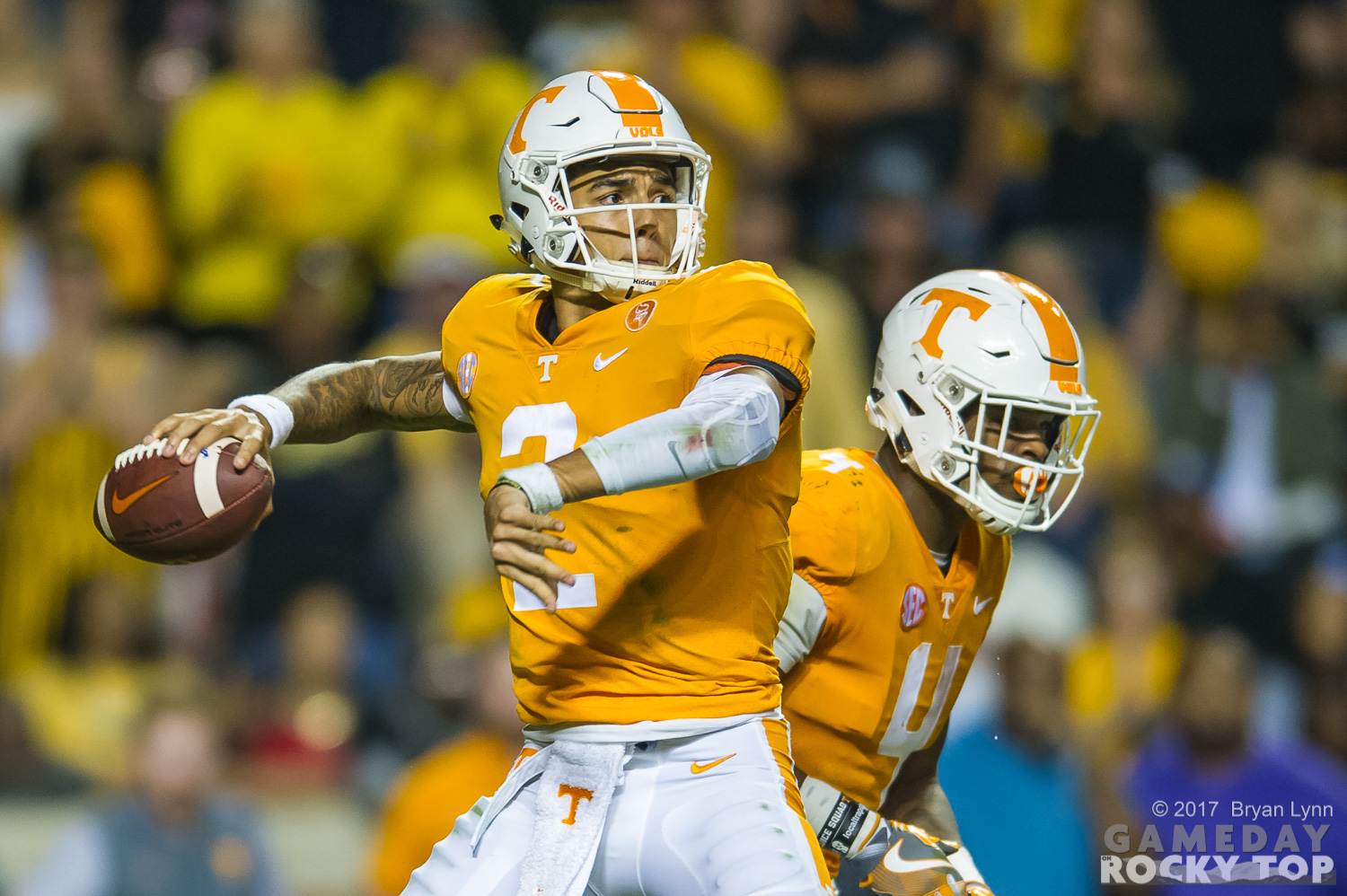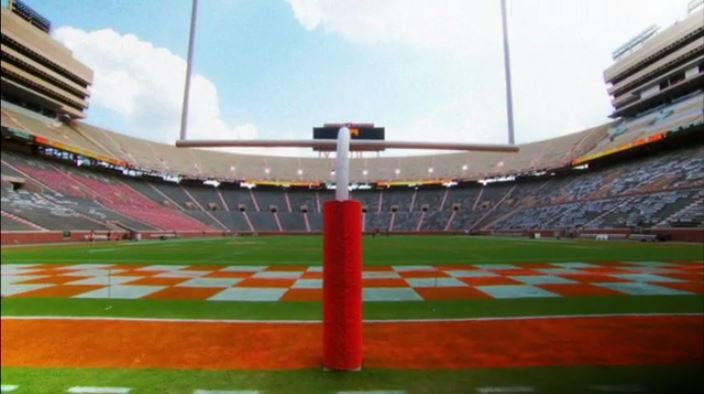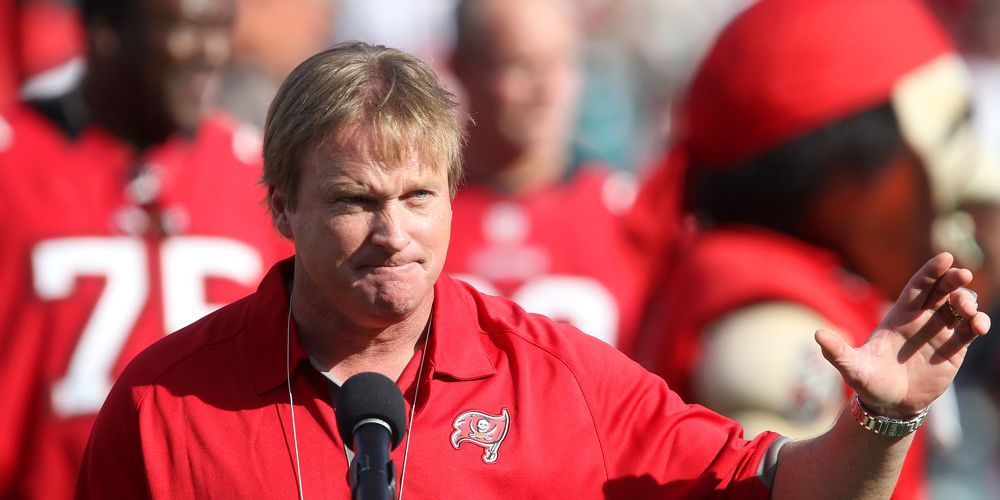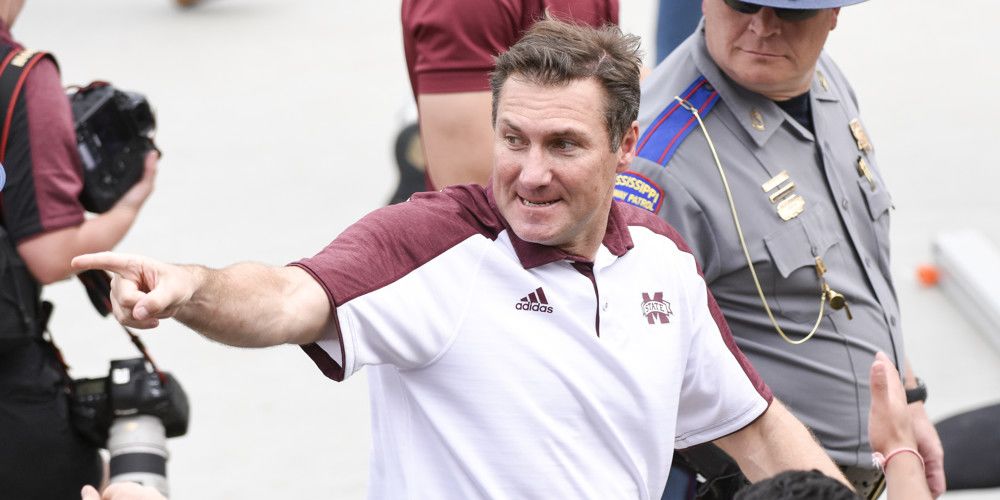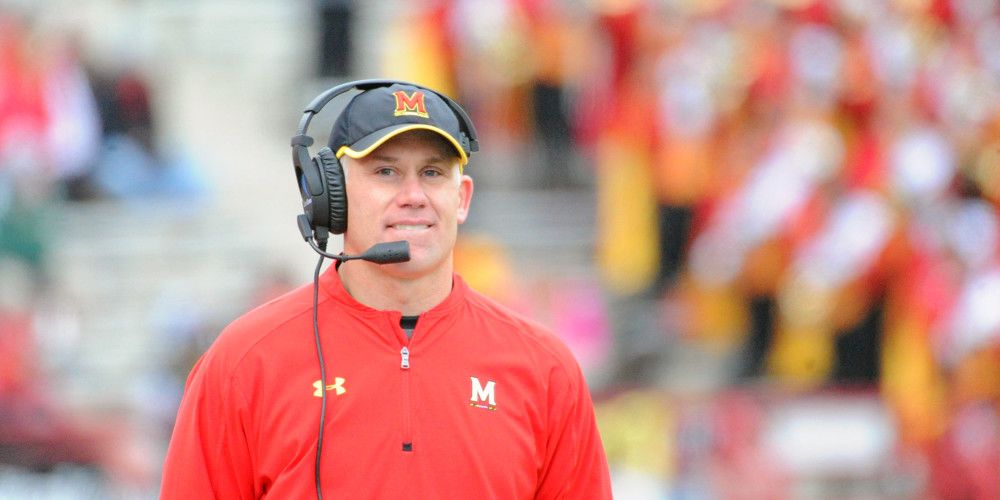Ever since the Tennessee Volunteers fired Phillip Fulmer back in 2008, they have been pursuing the elusive greener grass that prompted them into that action. At every major crossroad along the way, they chose a road to #nowhere, each one ending in failure at another dusty crossroad.
The desire to land Jon Gruden as Tennessee’s next head coach originated at that first crossroad back in 2008, as Gruden was at that time a successful head coach for the NFL’s Tampa Bay Buccaneers. At the time, Gruden said nice things about Tennessee when asked, but for whatever reason at the time, it didn’t happen.
The Grumors intensified at each subsequent crossroad. They were there when Lane Kiffin left and when Derek Dooley was fired, and now that Butch Jones has been relieved of his duties, the Grumors are at a fever pitch. Part of the reason for the intensity this time around is the belief in the veracity of one of the rumors from the last time, namely that Gruden was interested until he was told by Tennessee that they wanted to take a look at another guy first.
Today, we have a new athletic director and a generally more desperate group of decision-makers who presumably wouldn’t make that same mistake again. But still, all we have are rumors. The latest? Gruden has begun talking like he’d maybe he’s getting the itch to get back into coaching. Reports have surfaced that Gruden’s been calling former Vols to gauge their interest in “potentially joining him in Knoxville.” And almost immediately thereafter, there were reports that Gruden has no interest in being the next Tennessee coach.
Same as it ever was.
We don’t know what, if anything, is going on between the Vols and Jon Gruden at this particular time, and we probably can’t. But one this is certain: Gruden is the guy Tennessee’s been obsessing over more than anything else for nearly a decade.
So, how do you catch a white whale?
Let’s see how Alabama did it.
Alabama’s 38-day recruitment of Nick Saban
The following facts are gleaned from the excellent article by Al Blanton on Saturday Down South.
Context – A proud program that had become a laughingstock
For the past decade, the team had a 1-9 record against one of its rivals and a 3-7 record against two others. They’d also lost to several teams that they should never have lost to. They’d become a national joke.
They fired one coach for not winning enough, and then when his replacement abruptly left for another school, they hired a guy they had to fire immediately for misconduct. His replacement lasted four years and was adored in the beginning but mocked mercilessly at the bitter end.
This wasn’t Tennessee in 2017, but Alabama after the 2006 season. Having just fired Mike Shula, they were standing at yet another crossroad, the fourth in a decade. They needed to get this one right.
Day 1 – Identify Spurrier and Saban as the top targets, engage backchannel feelers
The guy in charge at the time was athletic director Mal Moore. A former Alabama backup quarterback under Bear Bryant, Moore had had a 31-year coaching career, primarily at Alabama, before settling in at the AD’s office. After five years as an assistant athletic director, he became the guy in charge of everything in 1999.
Moore fired Mike Shula in late November, and was desperately seeking a proven winner with a championship pedigree. The two guys he wanted most were Steve Spurrier and Nick Saban, with Saban his prime target.
On November 28, 2006, Moore began using back channels to gauge the interest of both Spurrier and Saban. Moore already had a relationship with Spurrier, so he was easier to reach. They talked multiple times, but Spurrier repeatedly told Moore that he was committed to what he was doing at South Carolina.
Moore didn’t know Saban. He did, however, have a nephew named Chuck who happened to be contractor who’d developed first a business relationship and then a friendship with Saban when Nick and his wife bought a home in Lake Burton, Georgia soon after taking the LSU job. So Moore called Chuck.
Moore would later communicate with Saban’s agent, Jimmy Sexton, but all of the preliminary rapport-building and warming up work was done surreptitiously through Chuck.
Day 6 – Interviews of Plan B candidates
On Sunday, December 3, Moore attended the National Football Foundation’s annual banquet in New York and used the opportunity to meet with some other coaching candidates, including Rich Rodriguez and Greg Schiano.
Day 7 – Clandestine preliminary meeting with agent nets bad news that they couldn’t talk to him yet
That Monday, December 4, Moore met with Jimmy Sexton in a private area of the hotel. Sexton told him that if Saban was going to talk to him, it wouldn’t be until after his season with the Miami Dolphins was over. Despite being discouraged by the bad news about the timing, Moore was encouraged by Sexton telling him that Saban wasn’t especially happy in the NFL and by a promise Sexton made to call Moore by Wednesday to let him know for sure whether he’d be able to talk to Saban after the Dolphins’ season.
Day 8 – Second interviews with Plan B candidates; decide whether to execute Plan B or continue pursuing top target
Moore met privately with each of Rodriguez and Schiano on Tuesday, December 5. Both were interested, and now Moore faced the decision of offering the job to one of them or waiting another month just for the opportunity to talk to Saban.
Day 9 – An impatient mistake
On Wednesday, Moore waited for Sexton to call. If Sexton told him that Saban didn’t want to talk to him, Moore could make the offer to either Rodriguez or Schiano relatively free of any anxiety. But if Sexton instead told him that he could talk to Saban after the Dolphins’ season, then he had a decision to make.
But when Sexton did not call at the time he said he would, Moore took that as a “no,” and immediately offered the job to Rodriguez. He accepted, and they scheduled a meeting between Moore and Rodriguez’s agent for the following day at Moore’s home.
But only minutes later, Sexton called. He’d been unable to call at the promised time because his flight had been delayed and he’d had no phone service. (The Saturday Down South article does not say whether Sexton told Moore at this time that Saban would talk after the season, but one can infer from the rest of the article that that question had still not been resolved.)
Day 10 – The intervention of fate
As the officials at Alabama were drawing up the contract for Rodriguez, and as Moore was meeting Rodriguez’s agent in his home to go over the details of his employment, a retired former assistant of Moore’s named Steve Townsend knocked at Moore’s front door. Moore answered, and Townsend told him that he had “impeccable” information that Rodriguez had decided to stay at West Virginia.
That turned out to be true, and publicly, Moore was humiliated, but privately, he was relieved that he could continue to pursue Saban.
Day 11 – A secret meeting; selling the school on the money
On Friday, 12/8/06, Moore called a secret meeting at his house. Those invited had to park blocks away for the sake of secrecy. Not even his colleagues in the athletic department knew the identities of these guys, as they were shuffled into a laundry room when the colleagues showed up for a meeting in another part of the house.
The first order of business concerned money. Saban was making over $5 million at Miami. Alabama had been paying Shula $1.55 million, and at the time, there were only a few college coaches making over $3 million. Moore and his team looked at the data and decided that they could offer Saban $4 million. The authority to make such an offer, though, would have to be granted by Alabama president Dr. Robert Witt and Paul Bryant, Jr.
Moore made the pitch, and they bought it.
Now Moore just had to get to Saban and sell him on it, too.
Days 14-18 – Another secret meeting with the agent, but no hint of interest one way or the other from the target
Sometime during the week of December 11, Moore met with Sexton in Tuscaloosa in another meeting so secretive that Moore was shuttled to Moore’s house after parking his car at a shopping center. They talked more details, but Sexton warned Moore that the deal was contingent on Saban agreeing to meet with him.
Meanwhile, Saban was in the midst of a grueling December with the Dolphins. After a 21-0 loss to Buffalo put the Dolphins out of playoff contention, rumors began to really heat up.
Day 24 – Saban says “No” to Alabama in front of the rest of the world
On Thursday, December 21, the whole thing began to boil over, and the press began hounding Saban about the rumors. He broke.
“I guess I have to say it,” Saban told the media. “I’m not going to be the Alabama coach.”
Days 25-36 – Moore flies to Florida without an appointment to see Saban anyway
Moore was not deterred by Saban’s public proclamation that he was not going to become Alabama’s next coach. He and Townsend began preparing for a trip to Florida for Moore for one last shot at Saban.
On New Year’s Day, Moore flew to Miami and checked in to a hotel in Fort Lauderdale that was a block from Saban’s house.
Day 37 – Moore desperately seeks an in-person meeting with Saban
Persistence
Moore spent the next two days in communication with the people on his team who were in contact with Sexton and Saban’s wife, Terry. The goal was to get Moore face-to-face with Saban himself.
At some point on Tuesday, Moore told Sexton that they needed to make this happen. When Sexton asked him to be patient, Moore responded that he was “taking this plane to Cuba if Nick Saban isn’t on it.”
Saban’s wife gives Moore an opportunity
It was Terry Saban who ultimately invited Moore to the house. They had lunch and hit it off, but Nick was at a year-end meeting with his players. Terry invited Moore back for dinner. When Saban called to tell her he was staying with the Dolphins, she insisted that he at least meet with Moore, and Saban finally agreed.
Moore closes the deal
That night, Moore finally convinced Nick Saban to come to Alabama. According to Terry, as quoted by Saturday Down South, Moore said all of the right things to Saban, the things that resonated with him the most:
“It was Mal Moore’s soft approach, fatherly advice, sweet Southern charm … ‘I’m here for you … come back home … back to where you belong … you are a college coach … we need each other …’ His siren songs were in my ears and I made sure Nick heard them. The three of us stood in our living room in tears, acknowledging that our hearts were still in college and that there was not a number that Wayne [Huizenga, owner of the Dolphins] could throw out to us that would make us reconsider what was the best thing for our family, not double, not triple. It was never about that.”
Day 38 – Moore brings the big fish home
Huizenga made one last pass at Saban, but ultimately gave Saban his blessing to leave. Saban informed his staff.
As the news of Saban’s departure spread, rumors about his arrival at Alabama boiled over.
Saban’s family piled into a Mercedes with their luggage and Mal Moore and headed north. Moore got Chuck on the phone to tell him the news. “We got him!”
Lessons on how to catch a white whale
Hard times lead to better efforts
It’s difficult to remember, but Alabama was absolutely reeling back in 2006, much like Tennessee is now. They’d tried the regular playbook for coaching hires multiple times, and it hadn’t worked. It was largely because they were desperate for success after so long without it that they went all in on their top target.
Planning to fail
Hearing that a school is talking to non-top target coaches doesn’t mean that they aren’t also still pursuing their top targets. It’s prudent to have a Plan B, and the above story suggests that there is more secrecy associated with top targets. Fans may hear more about Plan Bs than top targets.
Impatience can be a huge mistake
I don’t know how long Moore waited for that phone call from Sexton, but he should have waited longer. That has to be a pressure cooker of a situation, though, not knowing whether to take the bird in the hand right now or risk everything for Door No. 2. So, yes, you don’t want to miss an opportunity when it comes your way, but you also don’t want to settle too early while you’re still in pursuit of what you really want. Patience is still a virtue. It’s just that it also goes hand-in-hand with wisdom.
Fate
If Rodriguez hadn’t changed his mind for whatever reason, he’d have been the Alabama coach. Who knows what historical dominoes might have fallen instead had that actually happened. Some other school may have ended up with Saban or he may have ended up finding fulfillment in the NFL with Miami or some other team.
Sometimes the stars align and enable your efforts to succeed rather than fail.
The money isn’t solely up to the athletic director
Moore would likely not have landed Saban without paying him what they did. But it was a ton of money at the time, and his first job was to get the key decision-makers on board with spending so much. I would love to know the details of those conversations, and they would be fascinating. The athletic department had just struck out on three coaching hires in a row, and now they wanted how much? Credit Moore for getting that done and the decision-makers for agreeing.
Don’t take “No” for an answer
This is probably the biggest lesson from the entire story. Moore didn’t even get to talk to Saban directly until very near the end of the process. At best, he had mere hints that Saban might potentially be interested, and on the other side of the ledger, he had a very public proclamation from the man himself that it was not going to happen. But Moore was undeterred, and he remained so until he got into Saban’s living room and got Saban to say yes.
Never, never ever, underestimate the influence of the gate-keepers
Nick Saban said yes, and Mal Moore worked his tail off and didn’t give up, but it sounds to me like Terry Saban is the one who made it happen. At the very least, she is an absolutely crucial component to the story. She was the first one to listen to Moore himself. She was sold, and she “insisted” that Nick meet with him. That may be the main reason he did. It’s the same with any person who has the authority to grant access to a VIP. Sell them first, because they’ll likely be your best endorsement. They may make the deal for you.
An athletic director has to be a recruiter
Moore had experience recruiting players as a college coach. He knew how to sell and how to close the deal. He’d heard from Sexton that Saban wasn’t particularly happy in the NFL, and he likely heard from Terry at lunch that Saban missed college. And that was his pitch when he finally got some face time with Saban. According to Terry, it was that message that closed the deal.
Honestly, this is what concerns me the most about Tennessee going after Gruden right now. As far as I can tell, there’s nothing in John Currie’s background that would make you think he has experience at recruiting blue chips to programs. Hopefully, he recognizes this and delegates this most-important function to someone who does, someone like Phillip Fulmer. Or someone who can accomplish the same thing based on other factors, such as Peyton Manning or some other VFL.
The blue print
Getting a blue chip coach for your football program isn’t like posting the job on Indeed.com and waiting for the applications to pour in. White whales don’t apply for jobs. They are hunted, recruited for the position.
Recruiting is, at its base, sales. It helps to have a good product to sell, of course, but being good at sales also requires grit, determination, perseverance, luck, and not taking no for an answer. If you can’t reach the target, sell the gatekeeper (really, you should sell them regardless). And when you get in front of the guy, know what is important to him so that you can determine if it is indeed a good fit, and if it is, emphasize the right things in your pitch.
You may not land him, and it may not work out even if you do land him.
But if Tennessee can finally get its white whale, that scene at the Alabama airport the first week of January, 2006 will be dwarfed by what would transpire at McGhee-Tyson.


